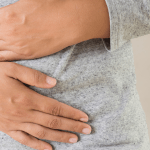Menopause marks a significant transition in a woman’s life, often accompanied by a variety of symptoms, including bloating. Bloating during menopause is a common complaint, characterized by a feeling of fullness, tightness, or swelling in the abdomen. This discomfort is primarily due to hormonal fluctuations, particularly the decline in estrogen levels, which can lead to water retention and changes in the gut microbiome. The gut microbiome plays a crucial role in hormone processing, and a decrease in its diversity can negatively impact digestive health, potentially causing bloating, gas, or constipation. Additionally, lifestyle factors such as diet, stress, and physical activity can influence the severity of bloating during this period.
Differentiating Between Bloating and Weight Gain
It is essential to distinguish between bloating and weight gain, as they are often confused. Bloating is usually a temporary condition marked by an increase in abdominal size throughout the day, particularly after meals or during hormonal fluctuations. In contrast, weight gain is a gradual increase in body weight that does not fluctuate in the same way. Menopausal weight gain tends to accumulate around the abdomen and is influenced by aging, lifestyle, and genetics. While both bloating and weight gain can occur during menopause, they have different underlying causes and management strategies.
Overview of Menopause-Related Gastrointestinal Changes
As women enter menopause, they may experience a range of gastrointestinal changes beyond bloating. These changes can include alterations in digestion speed, appetite, and the gut’s bacterial composition. Decreased stomach elasticity, reduced acid production, and slower intestinal motility are natural age-related changes that can exacerbate these symptoms. Stress, particularly prevalent during menopause, can further slow digestive processes, leading to a build-up of gas and bloating. Understanding these changes is crucial for managing symptoms and maintaining digestive health during menopause.
While bloating can be an uncomfortable and sometimes embarrassing symptom of menopause, it is often manageable through lifestyle adjustments and, in some cases, medical interventions. Recognizing the signs and understanding the causes are the first steps toward finding relief and improving overall well-being during this transitional phase of life.
Causes of Bloating in Menopause
Hormonal Fluctuations and Water Retention
One of the primary causes of bloating during menopause is related to hormonal fluctuations, particularly the decrease in estrogen levels. Estrogen influences the body’s balance of fluids, and as these levels drop, it can lead to water retention. This retention often manifests as a distended abdomen, swollen limbs, and a general feeling of puffiness. Progesterone, which has diuretic effects, also fluctuates during menopause, further complicating the body’s ability to manage fluid levels. The result is a hard, bloated stomach that many women experience during this phase of life.
Gastrointestinal Disorders and Menopause
Menopause can also bring about changes in the gastrointestinal tract, which may exacerbate bloating. A decrease in stomach elasticity, reduced acid production, and slower intestinal motility can all contribute to a feeling of bloating. Additionally, conditions such as irritable bowel syndrome (IBS) may worsen during menopause, leading to increased gas and bloating. The connection between low estrogen levels and a decrease in gut bacteria diversity can negatively impact digestive health, causing symptoms like gas, bloating, or constipation.
Dietary Factors and Food Intolerances
Diet plays a significant role in managing menopause-related bloating. Foods that are high in fat, sugar, and salt can exacerbate water retention and gas production. Conversely, a diet rich in fiber can help, although an abrupt increase in fiber may initially cause more bloating. It’s also important to consider food intolerances, which can become more pronounced during menopause. Common culprits include dairy, gluten, and certain artificial sweeteners, which can lead to increased gas and bloating.
The Role of Stress and Emotional Well-being
Stress and emotional well-being are closely linked to bloating during menopause. The body’s response to stress involves the release of cortisol, which can slow down the digestive system and lead to bloating. Additionally, the menopausal transition often coincides with significant life stressors, such as changes in family dynamics or professional responsibilities, which can compound the issue. Managing stress through mindfulness, exercise, and relaxation techniques can help alleviate bloating associated with emotional distress.
In summary, bloating during menopause can be attributed to a complex interplay of hormonal changes, gastrointestinal disorders, dietary habits, and stress levels. Understanding these factors is crucial for managing symptoms and improving quality of life during this transitional period.
Immediate Natural Remedies for Bloating
Herbal Solutions: Peppermint Oil and Tea
One of the most accessible and natural ways to alleviate bloating is through the use of herbal remedies, particularly peppermint. Peppermint oil and tea are renowned for their soothing properties on the digestive system. The menthol in peppermint acts as an antispasmodic, relaxing the smooth muscles of the gastrointestinal tract, which can help to release trapped gas and relieve the sensation of fullness. To harness these benefits, you can sip on peppermint tea after meals or take enteric-coated peppermint oil capsules, which are designed to pass through the stomach and release the oil directly into the intestines.
Physical Activity and Its Benefits
Engaging in regular physical activity is a potent remedy for bloating. Exercise stimulates the muscles of the digestive tract, facilitating the movement of gas and reducing water retention. Even a brisk 30-minute walk can significantly improve digestive function and decrease bloating. For those experiencing menopause-related bloating, incorporating daily movement into their routine can be especially beneficial, as it also aids in managing other menopausal symptoms such as mood swings and weight gain.
Yoga Poses for Gas Release
Yoga can be particularly effective for releasing trapped gas in the digestive tract. Certain poses, like the Pawanmuktasana (Wind-Relieving Pose) or the Apanasana (Knees-to-Chest Pose), are specifically designed to apply gentle pressure to the abdomen, which can help to expel gas and reduce bloating. Practicing these poses for a few minutes each day can provide immediate relief and promote overall digestive health.
Heat Therapy for Abdominal Relief
Applying heat to the abdominal area is a simple yet effective way to alleviate bloating. The warmth helps to relax the muscles, allowing gas to move through the intestines more easily. This can be done with a hot water bottle, a heated pad, or even a warm bath. The key is to ensure the heat is comfortable and not too intense, as excessive heat can be counterproductive.
Abdominal Massage Techniques
Abdominal massage is another technique that can offer quick relief from bloating. Gentle, circular massages in the direction of the large intestine can help to move gas along and relieve pressure. It’s important to use light pressure and to avoid massaging if there’s any abdominal pain or discomfort. This method can be particularly relaxing and can also be combined with essential oils like peppermint or fennel for added benefit.
Remember, while these remedies can provide immediate relief, they are not substitutes for medical advice. If bloating persists or is accompanied by other symptoms, it is crucial to consult a healthcare professional.
By the way, something for you, a little gift!!!
I am just in the middle of publishing my book. It’s about How women can balance their hormones. One part is about food and diet, of course.
Follow this link and enter your email.
I will send you this part of the book for free once the book is published. It has many concrete, practical tips and recipes and will help you feel better during menopause or times of Big hormonal fluctuations.
Annette, Damiva Lead for Health & Wellness

Lifestyle Changes for Long-Term Management
Dietary Adjustments to Reduce Bloating
Altering your diet is a pivotal step in managing menopause-related bloating. Begin by identifying and avoiding foods known to cause gas and bloating, such as beans, broccoli, and fatty or fried items. Embrace a diet rich in whole foods, fruits, and vegetables, while minimizing the intake of processed foods high in sugar and salt. Eating smaller, more frequent meals can also ease the digestive process and reduce bloating.
The Importance of Fiber Intake
Adequate fiber intake is essential for digestive health, particularly during menopause. Fiber helps regulate bowel movements, which can alleviate bloating. Aim for a mix of soluble and insoluble fiber from varied sources like whole grains, legumes, fruits, and vegetables. However, increase fiber gradually to allow your digestive system to adjust without exacerbating gas and bloating.
Mindful Eating Practices
Adopting mindful eating practices can significantly impact digestive comfort. Slow down your eating pace, chew thoroughly, and focus on your meal to prevent swallowing excess air, which contributes to bloating. Additionally, mindful eating encourages better recognition of hunger and fullness cues, helping to avoid overeating.
Sodium Reduction and Fluid Retention
Excessive sodium intake can lead to water retention, exacerbating bloating. Strive to reduce your salt consumption by avoiding processed foods and seasoning with herbs and spices instead. Reading food labels and preparing meals at home can help you control your sodium intake, thus reducing the risk of bloating due to fluid retention.
Probiotics and Gut Health
Probiotics play a crucial role in maintaining gut health by supporting a balanced microbiome. Incorporate probiotic-rich foods like yogurt, kefir, kimchi, and sauerkraut into your diet, or consider a probiotic supplement after consulting with your healthcare provider. A healthy gut flora can improve digestion and reduce symptoms of bloating.
In conclusion, managing menopause-related bloating involves a combination of dietary adjustments, mindful eating, and lifestyle modifications. By focusing on these areas, you can alleviate bloating and enhance your overall well-being during this transitional phase of life.

From unhappy, dry, and sandpaper to silky, smooth and feeling good. That’s Cleo. Cleo is a 100% natural labial balm to moisture and soothe “your other lips”. Cleo is chemical-free, water-free, pH optimized and helps maintain and restore your delicate labial skin’s natural flora. Ideal for daily use or as needed. Get the most silky, lovable lips ever.
When to Consult a Healthcare Professional
Recognizing Persistent Bloating
Bloating during menopause is a common symptom, often resulting from hormonal fluctuations, dietary habits, or gastrointestinal changes. While occasional bloating is expected, it’s important to recognize when bloating becomes persistent. Persistent bloating is characterized by a continuous feeling of fullness, tightness, or swelling in the abdomen that doesn’t resolve with simple dietary changes or natural remedies. If you notice that your bloating is not improving despite your efforts to manage it, or if it’s interfering with your daily activities and comfort, it may be time to seek medical advice.
Symptoms That Warrant Medical Attention
While menopausal bloating is typically benign, certain symptoms accompanying bloating should prompt you to consult a healthcare professional. These include:
- Severe abdominal pain: Pain that is sharp, persistent, or disrupts your daily routine.
- Unexplained weight loss: Losing weight without changes to your diet or exercise habits.
- Changes in bowel habits: Experiencing constipation, diarrhea, or changes in stool consistency that last more than a few weeks.
- Blood in stool: This could be an indicator of a more serious condition and should never be ignored.
- Nausea or vomiting: Persistent or recurrent episodes, especially if accompanied by bloating.
- Fever: An elevated body temperature can indicate an infection or inflammation.
If you experience any of these symptoms, or if your bloating is accompanied by a distended abdomen that doesn’t fluctuate throughout the day, it’s crucial to seek professional medical evaluation.
The Importance of Professional Diagnosis
Self-management strategies for bloating are often effective, but they are not substitutes for professional medical advice, especially when symptoms are persistent or severe. A healthcare professional can conduct a thorough evaluation, which may include physical examinations, blood tests, imaging studies, or referrals to specialists. This is vital to rule out other potential causes of bloating, such as ovarian cancer, gastrointestinal disorders, or hormonal imbalances that may require different treatments.
Moreover, a professional diagnosis can provide peace of mind and a tailored treatment plan. It’s important to remember that each individual’s experience with menopause is unique, and what works for one person may not work for another. By consulting with a healthcare professional, you can ensure that you receive the most appropriate care for your specific situation.
In conclusion, while menopausal bloating is often a normal part of the transition, it’s essential to be vigilant about your symptoms. Persistent or painful bloating, especially when accompanied by other concerning symptoms, should be evaluated by a healthcare professional to ensure proper care and to rule out any serious underlying conditions.
Conclusion: Managing Menopause-Related Bloating
Summarizing Natural and Lifestyle Remedies
Throughout the various stages of menopause, many women experience the discomfort of bloating. This sensation can be attributed to a combination of factors, including hormonal fluctuations, gastrointestinal changes, and lifestyle habits. To combat this, a variety of natural and lifestyle remedies have been discussed. Herbal solutions such as peppermint oil and tea can offer immediate relief by soothing the digestive tract. Engaging in regular physical activity, including specific yoga poses, can help to stimulate digestion and release trapped gas. Heat therapy and abdominal massage techniques have also been shown to provide abdominal relief by relaxing muscles and improving circulation.
Encouraging a Proactive Approach to Symptoms
It is essential for women to adopt a proactive approach to managing menopause-related bloating. This includes being mindful of dietary choices, such as reducing intake of foods known to cause gas and bloating, and increasing fiber consumption to maintain healthy digestion. Incorporating probiotics into the diet can also support gut health and reduce symptoms. Additionally, reducing stress through mindfulness and relaxation techniques can have a positive impact on gastrointestinal well-being. By being attentive to the body’s responses and making adjustments accordingly, women can significantly alleviate the discomfort associated with bloating.
Final Thoughts on Navigating Menopause with Comfort
Navigating menopause is a unique journey for every woman, but understanding and managing symptoms like bloating can lead to a more comfortable experience. By summarizing the natural and lifestyle remedies available, this article aims to empower women to take control of their menopausal symptoms. Encouraging a proactive approach to these symptoms is crucial, as it enables women to identify and implement strategies that work best for their individual needs. Ultimately, with the right knowledge and tools, women can navigate menopause with greater comfort and ease, minimizing the impact of bloating on their daily lives.











